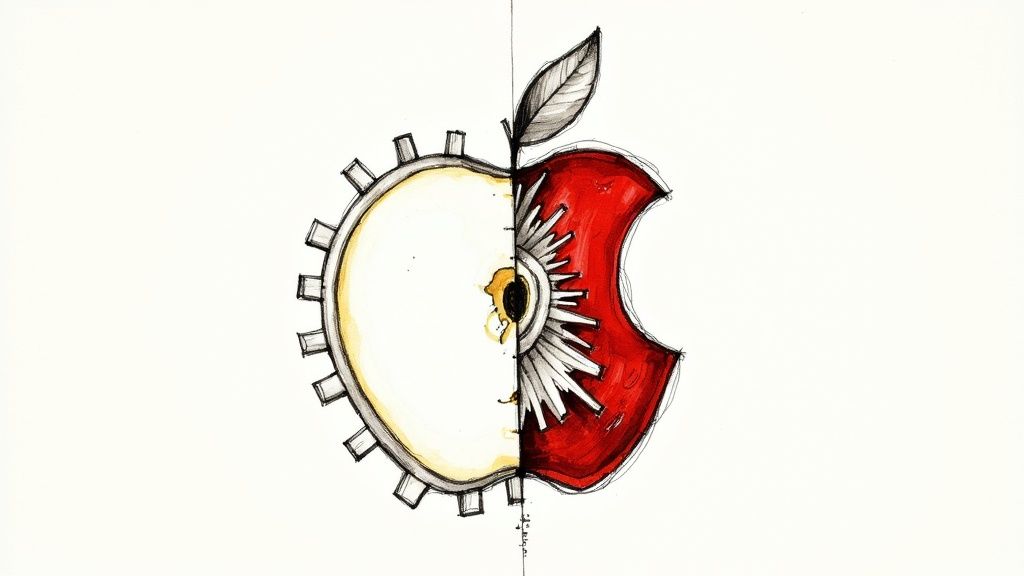A great biography does more than just recount a life; it immerses you in a different time, place, and perspective, revealing the human story behind history-shaping events and groundbreaking achievements. Finding the right one can be a transformative experience, offering lessons in resilience, innovation, and leadership. This curated guide is designed to help you discover some of the best recent biographies that have captivated readers and critics alike. We've selected titles that not only chronicle the lives of remarkable individuals but also explore the complex worlds they inhabited.
Whether you're interested in the relentless drive of a tech visionary, the quiet courage of unsung heroes, or the political mastery of a world leader, this list has something for you. Each entry provides a concise overview of the book's subject, highlights its core themes, and explains what makes it a must-read. From innovators who reshaped our world to figures who fought for monumental change, these biographies offer more than just facts. They provide a window into the ambition, struggle, and genius that define the human experience, making them essential additions to any reader's collection. Get ready to explore compelling narratives that are as informative as they are unforgettable.
1. The Power Broker: Robert Moses and the Fall of New York by Robert Caro
Robert Caro’s Pulitzer Prize-winning masterpiece, The Power Broker, is not just a biography; it is a monumental investigation into the nature of power itself, making it one of the best recent biographies for any serious reader. The book meticulously documents the rise and reign of Robert Moses, the unelected "master builder" who completely reshaped New York City and its suburbs throughout the mid-20th century. Caro reveals how Moses, without ever winning a popular vote, amassed enormous influence through public authorities, enabling him to build massive infrastructure projects like the Triborough Bridge and the Long Island Expressway.

This biography's power lies in its detailed exposure of the human cost of Moses's ambition. While he created iconic parks and beaches, his highways often tore through vibrant neighborhoods, displacing hundreds of thousands of people, particularly in minority communities. Caro’s narrative is a gripping, often tragic, exploration of how unchecked authority can transform idealism into tyranny.
Why It Belongs on This List
The Power Broker is a foundational text in modern biographical writing and political science. It has become essential reading in university courses on urban planning, public administration, and American history. Its influence extends globally, serving as a cautionary tale for city planners and civic leaders about the importance of community engagement and accountability. The book set a new standard for investigative biography, inspiring a generation of journalists and historians to dig deeper into the lives of powerful figures.
Actionable Tips for Readers
- Read in Sections: At over 1,300 pages, the book is immense. Treat it like a multi-part series rather than a single read. Focus on one major project or era of Moses's career at a time.
- Use Maps: Keep a map of New York City handy. Visualizing the locations of Moses's projects, like the Cross Bronx Expressway or Jones Beach, makes Caro’s descriptions of their impact much more powerful.
- Connect to Current Events: Consider how the themes of infrastructure, gentrification, and political power discussed in the book relate to urban development debates in your own city today.
2. Steve Jobs by Walter Isaacson
Walter Isaacson's definitive biography, Steve Jobs, offers an unprecedented, unfiltered look into the life of the iconoclastic genius who co-founded Apple. Based on more than forty interviews with Jobs conducted over two years, as well as interviews with over a hundred family members, friends, adversaries, and colleagues, this book stands as a monumental work in the canon of the best recent biographies. Isaacson paints a rich, often-conflicting portrait of a man driven by demons and passions, whose obsessive perfectionism revolutionized six major industries: personal computers, animated movies, music, phones, tablet computing, and digital publishing.

The narrative does not shy away from Jobs's difficult personality, presenting an unvarnished account of his abrasive management style alongside his visionary brilliance. This biography captures the essence of innovation, showing how Jobs's ability to merge artistry with technology created products that were not just functional but intensely desirable. It explores the fusion of creativity, intensity, and entrepreneurial spirit that defined both the man and the company he built, lost, and then returned to save.
Why It Belongs on This List
Steve Jobs became the template for the modern tech-executive biography, offering a candid look at the intersection of personality and product. Its influence is widely seen in business schools, where it is used to discuss leadership, design thinking, and corporate culture. The book sparked global conversations about the true cost and nature of genius, forcing readers to weigh Jobs's monumental achievements against his often-harsh treatment of others. It provides essential context for understanding Silicon Valley's culture and the figures who shape our digital world.
Actionable Tips for Readers
- Consider the Source: Remember that Jobs authorized this biography and participated extensively. Consider how his cooperation might shape the narrative, even with Isaacson's commitment to balanced reporting.
- Track Leadership Lessons: Pay close attention to the descriptions of Jobs's management style. Identify both the positive lessons in vision and focus, as well as the negative examples of poor interpersonal conduct.
- Explore Broader Context: To get a fuller picture of Apple's history and the tech industry, read this book alongside other top books about technology. This will help you understand the contributions of other key figures like Steve Wozniak and Jony Ive.
3. Hidden Figures by Margot Lee Shetterly
Margot Lee Shetterly’s Hidden Figures brings to light the incredible, long-overlooked true story of the African American women mathematicians who were instrumental to NASA's success during the Space Race. The book follows the brilliant careers of Katherine Johnson, Dorothy Vaughan, Mary Jackson, and their colleagues, who served as "human computers" at Langley Memorial Aeronautical Laboratory. Shetterly masterfully chronicles their fight against the twin barriers of racial segregation and gender discrimination to make foundational contributions to America's journey into space.

This inspiring narrative reveals how these women performed the complex calculations that enabled landmark achievements, such as John Glenn's orbit of the Earth. It’s a powerful testament to their resilience, intellect, and perseverance in an era that actively worked to diminish their role. More than just a story about space, it's a profound look at a pivotal moment in the Civil Rights Movement, making it one of the best recent biographies for understanding the intersection of science and social justice.
Why It Belongs on This List
Hidden Figures has had a monumental cultural impact, correcting a significant omission in American history and science. The book and its subsequent film adaptation sparked a global conversation about the contributions of women and people of color in STEM fields. It has led directly to increased diversity initiatives in tech and engineering and inspired countless educational programs. This biography’s focus on providing positive role models is a fantastic example of the importance of representation in children's books, showing young readers that brilliance knows no bounds.
Actionable Tips for Readers
- Explore Primary Sources: Watch documentaries about the Mercury and Apollo missions to see the historical context of the work these women were doing. NASA's archives offer photos and footage from the era.
- Connect to STEM: Look up some of the mathematical concepts mentioned, like orbital mechanics or trajectory analysis. You don't need to solve equations, but understanding the basics adds depth to their achievements.
- Read in Parallel: Pair Hidden Figures with other books about the Civil Rights era to better appreciate the societal pressures these women faced outside of their groundbreaking work at NASA.
4. Becoming by Michelle Obama
Michelle Obama’s memoir, Becoming, offers a rare and profoundly personal account of a life lived in the public eye, making it one of the best recent biographies for readers seeking inspiration and authenticity. The book charts her remarkable journey from a working-class neighborhood on the South Side of Chicago to Princeton University, Harvard Law School, and ultimately, the White House. Obama provides an intimate look at her challenges and triumphs, from balancing a demanding legal career with motherhood to navigating the unprecedented pressures of being the first African American First Lady of the United States.

This memoir’s strength lies in its candid exploration of identity, purpose, and resilience. Obama doesn’t shy away from discussing her moments of self-doubt or the societal obstacles she faced. Her narrative is a powerful reflection on finding your voice and staying true to your values, even when the world is watching. It became an instant global phenomenon, celebrated for its honesty and grace.
Why It Belongs on This List
Becoming is more than a political memoir; it’s a cultural touchstone that has resonated with millions worldwide. The book sparked vital conversations about work-life balance, representation, and the experiences of women in leadership. Its success has cemented its place as a modern classic in autobiographical writing and serves as a powerful resource in discussions on a wide range of topics, including many found in other great books about women's rights. For young readers especially, it offers a relatable and empowering story of ambition and perseverance.
Actionable Tips for Readers
- Understand It’s a Memoir: Remember that this is Michelle Obama’s personal story, told from her perspective. It is distinct from a biography, which is written by an outside author. Consider how her voice shapes the narrative.
- Discuss Key Themes: Use the book as a starting point for conversations about important topics like mentorship, public service, and dealing with criticism. Discuss her experiences with family, friends, or a book club.
- Contextualize the Era: To fully appreciate her story, consider the political and social climate during the Obama administration (2009-2017). Researching key events from that time can provide a richer understanding of the context she describes.
5. Leonardo da Vinci by Walter Isaacson
Walter Isaacson’s Leonardo da Vinci is an engrossing biography that connects the artist’s unparalleled creativity to his relentless curiosity, making it one of the best recent biographies for understanding the roots of innovation. Drawing from thousands of pages of Leonardo's personal notebooks, Isaacson crafts a portrait of a man whose genius was not just innate but cultivated through intense observation and interdisciplinary study. The book reveals how Leonardo's passions, from anatomy and geology to engineering and theater, all informed his legendary artwork, including the Mona Lisa and The Last Supper.
This biography's strength lies in its celebration of the connections between art and science. Isaacson demonstrates that Leonardo’s ability to see the world differently came from his refusal to separate disciplines. He studied the turbulence of water to paint swirling curls of hair and dissected human faces to capture the most fleeting of smiles. The narrative is a compelling journey into the mind of the ultimate Renaissance man, offering a timeless lesson on the power of being curious about everything.
Why It Belongs on This List
Leonardo da Vinci has become a modern classic for anyone interested in creativity, innovation, and the history of ideas. It is widely used in art history courses and has been influential in business and design circles, where it's referenced in workshops on innovation and interdisciplinary thinking. By showing how Leonardo's scientific inquiries made him a better artist, Isaacson provides a powerful argument for a holistic approach to learning and creation, inspiring readers to find connections in their own varied interests.
Actionable Tips for Readers
- Study the Illustrations: The book is rich with images of Leonardo’s art and notebook sketches. Take time to pause and examine them, connecting Isaacson's analysis to the visual details.
- Focus on Themes: Instead of reading chronologically, you can group chapters by theme. Read the sections on anatomy, then hydraulics, then painting to see how his knowledge in one area fueled another.
- Connect with the Art: If possible, plan a visit to a museum that houses works by Leonardo or his contemporaries while you are reading. Seeing the art in person can bring Isaacson’s descriptions to life.
6. Educated by Tara Westover
Tara Westover’s astonishing memoir, Educated, chronicles her extraordinary journey from a survivalist family in rural Idaho, isolated from mainstream society, to the hallowed halls of Cambridge University. It is a powerful and unflinching account of the quest for knowledge and self-discovery, making it one of the best recent biographies for readers grappling with identity and belonging. Westover was raised without a birth certificate, formal schooling, or medical care, yet she possessed an insatiable curiosity that propelled her to defy her family’s rigid beliefs and seek an education against all odds.
The memoir’s emotional core is the painful schism that develops between Westover and her family. As her worldview expands through learning, she is forced to confront the abuse and manipulation that defined her childhood. Educated is a profound exploration of family loyalty, the price of knowledge, and the courage it takes to forge your own path, even if it means leaving behind everyone you have ever known.
Why It Belongs on This List
Educated became a cultural phenomenon, sparking vital conversations about educational access, the lasting impact of trauma, and the complex nature of memory. It is frequently assigned in university courses on memoir writing and sociology, celebrated for its literary quality and its raw, honest storytelling. The book has empowered countless readers to reflect on their own educational journeys and the ways in which family and environment shape our understanding of the world.
Actionable Tips for Readers
- Prepare for Emotional Content: The book contains vivid descriptions of physical and emotional abuse. Be mindful of this as you read and allow yourself to take breaks if the material becomes overwhelming.
- Reflect on Education's Role: Use the memoir as a prompt to consider the role education has played in your own life. Think about how learning has shaped your beliefs, relationships, and sense of self.
- Consider Unreliable Narration: Westover is honest about the fallibility of memory, often noting where her recollections differ from others. This is a great opportunity to think critically about how personal histories are constructed and told.
7. Grant by Ron Chernow
Ron Chernow’s Grant is a landmark work that masterfully rehabilitates the legacy of one of America's most misunderstood presidents and generals. In this epic biography, Chernow dismantles generations of historical caricature that painted Ulysses S. Grant as a simple-minded brute and a failed president. Instead, he presents a deeply nuanced portrait of a brilliant, compassionate, and resilient man who was pivotal not only in winning the Civil War but also in fighting for the rights of Black Americans during the turbulent Reconstruction era. Chernow’s exhaustive research and compelling narrative make this one of the best recent biographies available.
The book vividly chronicles Grant's journey from a humble Ohio upbringing to his unlikely rise as the Union’s top general. It details his strategic genius in campaigns like Vicksburg and his magnanimous terms at Appomattox. Chernow gives equal weight to Grant's presidency, highlighting his courageous, though ultimately fraught, efforts to crush the Ku Klux Klan and protect the civil rights of newly freed slaves, challenging the long-held "Lost Cause" narrative.
Why It Belongs on This List
Grant has profoundly reshaped both academic and popular understanding of the 18th president and the Reconstruction period. It has been instrumental in sparking a re-evaluation of Grant's presidency, moving it from the bottom ranks to a more respected position among historians. The book is frequently assigned in university courses on the Civil War, Reconstruction, and the American presidency, serving as a definitive modern text on its subject and inspiring new scholarship.
Actionable Tips for Readers
- Follow the Campaigns with Maps: Grant's military career is central to his story. Keep maps of Civil War battlefields handy to trace his movements and better appreciate the strategic decisions Chernow describes.
- Focus on the Reconstruction Era: Pay close attention to the second half of the book. Grant's presidential years are often overlooked in popular history, yet his fight against domestic terrorism and for civil rights is a vital and relevant story.
- Read Alongside Other Histories: To gain a richer understanding, consider pairing this biography with a broader history of the Civil War or Reconstruction, which will provide wider context for the events and figures Grant interacted with.
8. The Immortal Life of Henrietta Lacks by Rebecca Skloot
Rebecca Skloot's groundbreaking work, The Immortal Life of Henrietta Lacks, is a powerful blend of science journalism, family saga, and ethical inquiry, making it one of the most essential and best recent biographies available. The book tells the story of Henrietta Lacks, a poor Black tobacco farmer whose cancer cells, taken without her consent in 1951, became the first immortal human cell line, known as HeLa. Skloot masterfully alternates between the scientific odyssey of these cells, which became vital for developing the polio vaccine, cloning, and gene mapping, and the poignant, often difficult story of the Lacks family.
The narrative uncovers the profound personal cost behind a monumental scientific breakthrough. While HeLa cells generated billions of dollars for medical companies, Henrietta's family lived in poverty, unaware of her contribution for decades. Skloot’s compassionate reporting gives a voice to the Lacks family, exploring their struggle with their mother's legacy and the broader issues of medical ethics, racial injustice in healthcare, and the concept of bodily autonomy.
Why It Belongs on This List
The Immortal Life of Henrietta Lacks has had a profound impact far beyond the literary world. It is now required reading in countless high school and university courses covering science, bioethics, and American studies. The book's exposure of historical inequities directly influenced policy discussions at institutions like the National Institutes of Health regarding tissue research and patient consent. It has fundamentally changed the public conversation about who benefits from medical research and the importance of acknowledging the human stories behind scientific advancement.
Actionable Tips for Readers
- Don't Skip the Science: Skloot makes the complex science behind cell cultures accessible. Embrace these sections, as understanding the "immortality" of HeLa cells is key to appreciating their incredible impact.
- Trace the Ethical Questions: As you read, keep a list of the ethical dilemmas presented. Consider questions of consent, privacy, and compensation as they arise and how they relate to medical practices today.
- Explore the Lacks Family Legacy: After finishing the book, look up the Henrietta Lacks Foundation, founded by the Lacks family. This provides a real-world connection to their ongoing efforts to secure recognition and justice.
Top 8 Biographies Comparison
| Title | 🔄 Implementation Complexity | ⚡ Resource Requirements | 📊 Expected Outcomes | 💡 Ideal Use Cases | ⭐ Key Advantages |
|---|---|---|---|---|---|
| The Power Broker: Robert Moses and the Fall of New York | High (extensive archival research, 1,100+ pages) | High (time and focus needed) | Deep insights into urban planning and power | Urban planning, political science, detailed biographies | Masterful storytelling; Pulitzer Prize winner |
| Steve Jobs | Medium (interviews & authorized biography) | Medium (interview access needed) | Insight into product development and leadership | Tech industry, leadership studies, innovation | Unprecedented access; honest and engaging |
| Hidden Figures | Medium-High (archival & interview research) | Medium | Increased awareness of African American women's contributions in STEM | Space history, civil rights, STEM diversity | Reveals untold stories; inspiring biographies |
| Becoming | Low-Medium (personal memoir) | Low-Medium (personal narrative) | Intimate perspective on American politics and society | Memoirs, political life, women’s rights | Authentic voice; emotionally engaging |
| Leonardo da Vinci | High (thousands of notebook pages) | High (multidisciplinary research) | Comprehensive understanding of Renaissance creativity | Art history, creativity, interdisciplinary studies | Masterful synthesis; excellent visuals |
| Educated | Medium (memoir with personal accounts) | Low-Medium | Powerful story about education’s transformative power | Memoirs, education, family dynamics | Compelling narrative; accessibility |
| Grant | High (extensive archival research) | High | Reevaluation of Civil War and Reconstruction history | American history, military studies, presidency | Thorough research; Pulitzer Prize winner |
| The Immortal Life of Henrietta Lacks | Medium-High (science & biography) | Medium-High | Ethical discussions and impact on medical research | Medical ethics, bioethics, science history | Accessible science; important ethical context |
Expanding Horizons: The Enduring Power of Biography
The lives we’ve explored in this collection, from the ambitious city-shaping of Robert Moses in The Power Broker to Michelle Obama’s inspiring journey in Becoming, are more than just historical accounts. They are blueprints of human experience, filled with triumphs, failures, and the quiet moments of decision that shape a legacy. Each of these titles demonstrates that the best recent biographies are not merely chronicles of events; they are deep dives into the very essence of what it means to be innovative, resilient, and profoundly human.
Whether it's Walter Isaacson revealing the complex genius of Steve Jobs and Leonardo da Vinci or Rebecca Skloot uncovering the vital, untold story of Henrietta Lacks, these books offer a powerful lesson: great lives are rarely simple or linear. They are marked by relentless curiosity, ethical dilemmas, and the courage to challenge the status quo. The stories of the "human computers" in Hidden Figures and Ulysses S. Grant's determined leadership show us that history is often shaped by those who persist against overwhelming odds. Tara Westover’s Educated provides a stark, modern reminder of the transformative power of knowledge and the fight for self-definition.
Key Takeaways for Young Readers and Mentors
To truly benefit from these incredible stories, consider these actionable steps:
- Connect Past to Present: As you read about figures like Robert Moses or Steve Jobs, discuss their impact on the world today. How do their decisions, both good and bad, still influence our technology, our cities, and our culture?
- Explore the "Why": Look beyond the accomplishments. Why did Michelle Obama prioritize certain initiatives? What drove Tara Westover to seek an education against her family's wishes? Understanding a person's motivation is the key to understanding their story.
- Seek Out Diverse Voices: The biographies on this list represent a range of experiences, but it's only a starting point. Make a conscious effort to find biographies about people from different backgrounds, cultures, and fields to gain a more complete picture of human achievement.
Building on the Foundation of Story
Reading about these remarkable individuals can inspire confidence and a sense of possibility in young readers. Biographies show that even the most celebrated figures faced doubt and adversity. Beyond biographies, other genres can significantly impact young readers. For a different but equally enriching reading experience, explore resources like a list of top books for teen self-confidence, which offer fictional narratives and guides focused on building inner strength. The ultimate goal is to use stories as a tool for empathy, understanding, and personal growth. By engaging with the lives of others, we learn more about ourselves and the incredible potential that resides within us all.
Are you inspired by these powerful true stories and looking for the next generation of compelling narratives? Number 6 Publishing is dedicated to discovering and promoting unique voices in middle grade and YA fiction, creating the biographies of tomorrow. Explore our curated catalog of inclusive and imaginative books at Number 6 Publishing.
